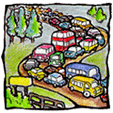| Countable and uncountable nouns |
Substances (like water), abstract qualities (like love), and things seen as a whole (such as traffic) are uncountable in English:
substance |
quality |
'whole' |
 |
 |
 |
| water | love | traffic |
Uncountable nouns can
be used alone, without a determiner ![]() :
:
Crocodiles are the largest reptiles and live mostly in [ ] fresh water.
All you need is [ ] love.
Uncountable nouns have no singular-plural contrast. This means that you cannot say, for example,

aninformation [or informations]
We can count uncountable nouns by using a Quantifier ![]() in a structure such as a bit of or two
pieces of. Note that bit is more appropriate for informal situations:
in a structure such as a bit of or two
pieces of. Note that bit is more appropriate for informal situations:
Let me give you a bit of advice, my friend.
There is an important piece of information missing from this report.
Here are some further examples: a bit of fun, a bit of coal, a bit of paper, a bit of butter, a bit of bread, two pieces of paper, two pieces of furniture, two pieces of music, two pieces of wood, two pieces of silver, etc.
Although we can't use numbers with countable nouns, we can refer to the amount of substance (such as water) according the container it is in. In this way we are able to count uncountable nouns, eg a glass of water, two bottles of milk, three cartons of juice, five packs of butter, six packets of salt, seven tubes of toothpaste, eight sacks of flour, nine jars of jam, ten boxes of soap powder, etc.
Sometimes we do not necessarily want to count beyond one, but we may want to use a word which helps to describe the uncountable noun: a rumble of thunder, a flash of lightning, a gust of wind, a shower of rain, a cloud of smoke, a breath of fresh air, a fit of temper, a means of transport, an article of clothing, an item of news, a state of emergency.
If we do not need to indicate the amount, uncountable nouns can be used either by themselves (I must get bread and milk) or with determiners, especially the (Grandpa said he would bake the bread.)
Most abstract nouns such as love, friendship, peace are uncountable.
Nouns that refer to substances or qualities are characteristically uncountable, usually because they cannot easily be divided into separate parts: water, air, honesty. Some uncountable nouns are neither substances nor qualities, but a group of things seen as a whole: traffic, furniture, rubbish, luggage. Note that students sometimes have problems with words like these because individual items within the group may seem to be countable.
| For information about some of the problems that students have with uncountable nouns, click here: |  |
|
Tell me more ... Introduction |
|
||
To give us feedback about this section, click here or on the Comment button at the top of the screen.
If you have any questions about this section, visit the Language Corner.
If you have any questions or suggestions about how to teach this section, send a message to the Teaching Corner.